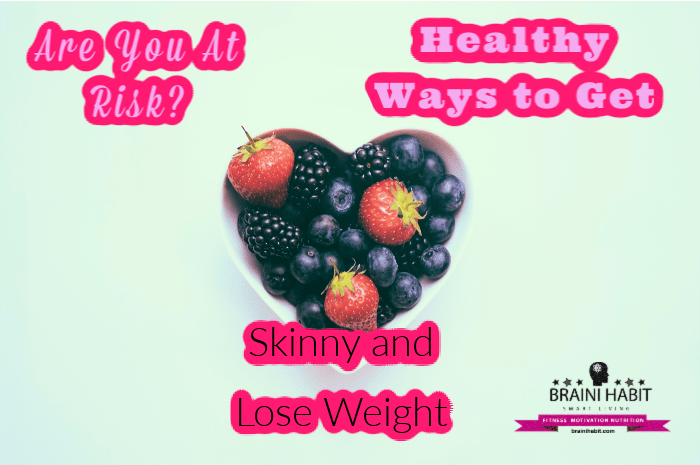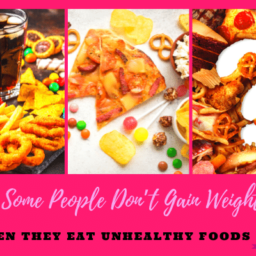During the summer everyone is looking for a way to lose weight quickly.
Not every diet works, and not every diet that will help to make you skinny is a healthy one.
A lot of diets put you in a calorie deficit in a very unhealthy way by significantly restricting your dietary choices. Examples are veganism, raw eating, 90-day diets, etc.
In this article, we will go over the healthier options, how to slim down and get rid of unwanted fat.

- Understanding energy balance is crucial
- Counting calories is a good place to start
- Intermittent fasting can be healthy and easy
- The ketogenic diet is suitable for some
- Mediterranean diet is for good health
- The best diet is healthy, balanced and sustainable
- Physical activity for getting skinny even faster
- The bottom line on how to get skinny and stay healthy
Understanding energy balance is crucial
To slim down we have to meet the main requirement for weight loss – a negative energy balance.
Just like anything else in the universe, our body also obeys the laws of thermodynamics.
Evidence has confirmed that weight loss depends only on the size of the calorie deficit (1).
You cannot put less energy in your body compared to the energy you spent, and expect not to lose weight.
What exactly is an energy balance?
It is the balance between energy intake and energy expenditure.
That balance can be positive when the intake prevails. Negative when the expenditure is higher. Finally, zero when they are equal.
Energy intake will depend on how many calories you consume with your diet. In addition, energy expenditure depends on a number of factors.
The factors are – basal metabolic rate, physical activity, and diet-induced energy expenditure (2).
Basal metabolic rate is the energy spent by your body to maintain the normal function of its systems and organs.
Basal metabolic rate burns the most amount of calories, even in individuals with high physical activity.
This includes thermogenesis, heartbeat, brain function, kidney filtration, liver metabolism, etc.
Every organ has a specific resting energy expenditure, measured per pound of tissue (3).
The size of an organ determines its impact on the overall metabolic rate.
Muscles, for example, are 30-40% of our total body mass have the biggest impact.
Physical activity is the other factor, which includes all movements we do daily, including moving around our homes, walking, sports and other activities.
Diet-induced energy expenditure is related to the digestion, absorption, and storage of every food we eat.
Some nutrients in the diet like protein require more energy to be digested.
Take-Away: The energy balance is the equation between calories intake and caloric expenditure. It is what determines if we will gain or lose weight.
Counting calories is a good place to start
The most logical conclusion with calorie deficit is that counting the calories we eat is the way to go.
There are many calorie counters to estimate the calories you burn daily, depending on your weight, body fat and physical activity.
Weighting your meals and listing them down throughout your day can give you a good idea of how much to eat and when to stop.
For a lot of people, it is very helpful to find out their actual caloric intake.
Studies show that people who do not count their calories underestimate the amount they consume (4)(5).
Counting calories for a period of time can help people to estimate better their relative caloric intake.
In addition, counting calories helps people become more aware of their own unhealthy habits.
A lot of people start noticing that they are making the wrong dietary choices by picking mostly high caloric foods that do not provide sufficient feeling of fullness.
Also, other people notice that they snack too much between meals or eat most of their calories at night.
Counting calories
Counting calories allows us to better balance our calorie consumption restrict the foods that do not provide satiety.
However, counting calories has its disadvantages. For many people counting calories becomes more important than the actual choice of food. Some use it as an excuse to eat mostly junk food.
Others get obsessed with calories and restrict themselves too much. As a result, they become are more likely to binge eat.
Counting calories can trigger obsessive-compulsive behavior and become a source of an eating disorder.
For some people counting calories is simply too demanding, stressful or consumes too much time.
This is why counting calories should not be recommended for a long-term diet.
Sustainability is the most important factor for long-term weight control.
Take-Away: Counting calories is the most precise method to maintain a calorie deficit and lose weight. However, it is not sustainable in the long term.
Intermittent fasting can be healthy and easy
Intermittent fasting is another effective way to slim down and keep yourself healthy.
There are many types of fasting, but what we recommend as healthy are daily fasts not longer than 16-18 hours.
This means that the time a person has to eat on that diet every day is only within a 6-8 hour window.
This naturally creates a calorie deficit and leads to weight loss.
Fasting is speculated to increase the insulin sensitivity of the organism.
It is can be suitable for people with busy schedules, who do not have access to healthy meals.
By skipping meals, intermittent fasting is a perfect fit for busy schedules.
A study shows that intermittent fasting as a diet can be beneficial for people with eating disorders (6).
Intermittent fasting might not be suitable for everyone. For example, some people who have morning cravings simply cannot skip breakfast.
For them, it is better to have a satiating meal at breakfast and reduced caloric intake throughout the day.
Others have their workouts in the morning. Working out fasted significantly affects performance and reduces its effectiveness.
Women normally have lower blood pressure.
Intermittent fasting can lead to drops in blood pressure and blood sugar and it is not suitable for them.
According to science, intermittent fasting doesn’t have any advantage in terms of weight loss when compared to other diets.
It simply creates a deficit by skipping a meal and restricting the time during which you eat.
A meta-analysis compared it to other weight-loss diets with caloric restriction and found no superiority of intermittent fasting (7).
It is true that fasting increases the levels of growth hormone (8).
Intermittent fasting is praised as a healthy diet because its helps you simultaneously lose fat and preserve muscle.
However, fasting also leads to a decrease in the levels of insulin-like growth factor–1, which is much strongly associated with muscle development (9).
This means that the elevated levels of growth hormone, simply compensate for the low levels of the growth factor and the overall effect for the body is the same.
Reducing the insulin-like growth factor and increasing growth hormone via intermittent fasting might have other health advantages which makes the diet healthy, but not a better method for weight loss.
Take-Away: Intermittent fasting can effectively lead to weight loss along with other health benefits. However, it is not superior to other diets and might not be suitable for everyone.
The ketogenic diet is suitable for some
This is a diet with a complete restriction of carbohydrates. Such a diet usually consists of 20% protein, 75% fat, and less than 5% carbohydrates.
Carbohydrates are not essential for our bodies. They can be synthesized from protein and also ketones can be used as an alternative energy source.
For such a diet to be healthy, starchy vegetables but rich in vitamins and fiber have to be regularly consumed.
Also, we need to be careful about our choices of fat sources. Unsaturated fats are always preferred instead of saturated or hydrogenated options.
Saturated fat and hydrogenated fat increase the risk of cardiovascular diseases.
Benefits of Ketogenic diet
When the brain uses ketones as an alternative fuel, it can suppress the symptoms of epileptics (10).
It is proven that ketones also suppress appetite, which is very helpful for controlling your caloric intake (11).
The ketogenic diet is quite suitable for people who like to consume a lot of fats in their menu.
However, the diet is not superior to other healthy weight loss diets.
Multiple studies show that in terms of weight loss there is no benefit of keto (12).
A study showed only a kilogram higher of weight loss among the subjects on keto during the 1st year (13).
The theory that carbohydrates and insulin are responsible for weight gain, and excluding them from the diet can aid weight loss, has been proven incorrect (14).
When there is an excess of calories, fat can be stored via a hormone called acylation stimulating protein.
A study shows that weight loss from keto is aided by the higher amount of proteins (15).
Ketogenic Diet Concerns
A huge problem with the diet is the high level of restriction in terms of dietary choices. This makes the diet hard to follow in the long-term.
The keto diet might also increase the levels of LDL, which is responsible for increased risk of atherosclerosis and cardiovascular diseases (16).
The ketogenic diet has some unpleasant side-effects including breath smelling like acetone and constipation.
Some concerns have been raised about the effects of cutting out carbohydrates entirely.
Evidence shows that mortality might be lowest in populations with 50-55% of their caloric intake coming from carbohydrates (17).
Let’s not forget that some of the nations with the longest lifespan have their diets based largely on carbohydrates.
Take-Away: The ketogenic diet can quickly lead to weight loss. However, it is hard to be consistent with and might hide long-term health risks.
Mediterranean diet is for good health
It is a quite popular diet, widely known as healthy and preventive in terms of cardiovascular diseases and cancer (18).
The benefits of this diet to cardiovascular health come from a few factors.
Typical for this diet is the high level of consumption of fruits, vegetables, cereals, legumes.
All these products are quite rich in fiber, which has numerous health benefits.
Fiber reduces the risk of colorectal cancer and lowers the levels of blood cholesterol (19).
Fats and Mediterranean diet
Another aspect of the diet is moderate consumption of olive oil, milk products, fish, and seafood while the consumption of other types of meat is kept low.
This supports the body with poly and monounsaturated fatty acids which are beneficial to cardiovascular health while restricting the detrimental effect of saturated fat (20).
Fatty fish is also a source of omega 3 – an essential fatty acid with antioxidant effect, and a great source of vitamin D – the most common vitamin deficit.
However, because of the large quantities of healthy fat, especially olive oil, this might not be a suitable diet for everyone.
It might be harder to reach a calorie deficit for some people, especially if they are not very physically active.
Overall this is a very healthy diet, which can also help in weight loss if calories are restricted.
Take-Away: The Mediterranean diet is generally a very healthy and balanced diet. However, it needs additional tweaks to be specifically suitable for weight loss.
The best diet is healthy, balanced and sustainable
The most optimal way to lose weight is by eating a healthy, balanced diet.
Healthy eating supplies the proper amount of calories and nutrients a person needs.
Healthy nutrition can reduce the risk of heart disease, diabetes, cancer, help us fight infections and much more.
Improper diet is one of the most prominent contributors to mortality (21)(22).
Our nutrition has to be balanced in two main aspects – calories and nutrients.
Balancing our caloric intake with the energy we spend is what will help us keep optimal weight. Being overweight or underweight is not healthy.
We have some tips to help you stay in a calorie deficit, without counting each calorie:
- Eat only until feeling full, don’t let yourself overeat – overeating will get you very quickly in a caloric surplus.
- Drinking more water during meals helps create volume and satiation.
- Plan your meals to avoid snacks and extra meals. When you eat around a schedule, you get hungry at the same time This way you can plan what to eat and make your main meals enough satiating, helping you skip the extra calories from snacks in-between.
- Eating protein in every meal – protein is slower to digest, which will help you keep the feeling of fullness on lower caloric intake.
More Tips on Calories:
- Eat more non-starchy vegetables. Fiber in vegetables also provides great satiation. The recommendation is at least 400 g of fresh fruits and vegetables daily.
- Skip the dessert, add it only to a meal after intensive physical activity.
- No liquid foods with calories – they provide no satiation and you can very easily overeat on high sugar and calories they contain.
- Avoid eating processed and junk foods – usually, those are foods high in sugar, saturated fats, and calories.
- Avoid healthy foods when they are highly caloric – although healthy, foods like oils, nuts, and honey are high in fat, very caloric and not suitable for weight loss (23).
The most important aspect of weight loss is being consistent with the diet (24).
A healthy and balanced eating pattern is easier for most people to follow and be consistent with.
Take-Away: Any diet can be effective in terms of weight loss if it meets the requirements of a healthy diet and a person can be consistent in following it.
Physical activity for getting skinny even faster
Physical activity is an important factor for weight loss.
As we mentioned, it is a contributor to the energy balance and higher physical activity can help us reach a calorie deficit.
Any type of sport with a high level of physical activity (except maybe sumo) can be helpful for weight loss.
You are much more likely to be consistent with that sport if you like it.
If you are looking for a method to increase your physical activity just for weight loss, there are two common options – cardio and weight training.
Cardio is usually people’s 1st choice
Low intensity cardio can be suitable for people who have cardiovascular problems or for severely obese people.
However, cardio is not a good long-term method for fat loss. Cardio does not preserve muscle tissue.
On the contrary, it might even lead to the loss of fat and muscle mass.
As we already stated muscle mass is the main driver for our basal metabolic rate – the one that burns the most amount of our total caloric expenditure.
This is why it is best to implement weight training as physical activity. It will help preserve or even increase the muscle and respectively your metabolism.
This way we will burn more calories in and out of the gym.
Regular physical activity also can lower the risk of cardiovascular diseases, cancer, and diabetes.
Take-Away: Physical activity is a method for improving weight loss and health.
The bottom line on how to get skinny and stay healthy
The main factor for weight loss is the calorie deficit.
If that requirement is met, equal weight loss can be achieved, no matter if the diet is balanced, intermittent fasting, ketogenic, Mediterranean, etc.
The most suitable diet to achieve a calorie deficit and slim down will depend on personal factors and preferences.
Every diet can be a healthy and effective in terms of weight loss, for as long as a person is consistent with it.





